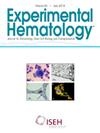Distinct transcriptional changes in hematopoietic progenitor subsets on LPS-induced emergency granulopoiesis
IF 2.1
4区 医学
Q2 HEMATOLOGY
引用次数: 0
Abstract
Emergency granulopoiesis is a critical process by which hematopoietic progenitors and stem cells facilitate enhanced granulocytic production during severe infections. However, the role of distinct multipotent progenitors (MPPs) at early stages of this process remains underexplored. Here, we investigated the contribution of MPPs to granulocytic production following lipopolysaccharide (LPS) administration in wild-type mice, simulating a bacterial infection. Transplantation assays demonstrated that LPS exposure reduces the engraftment capacity of lymphoid-biased MPP4 and enhances lymphoid production, rather than supporting myeloid lineage output. Further, single-cell RNA sequencing (scRNA-seq) of MPPs isolated from control and LPS-challenged mice revealed transcriptional reprogramming of nonlineage committed MPPs toward myeloid- and erythroid-biased progenitors. Notably, inflammatory progenitor populations emerged on activation of LPS-induced emergency granulopoiesis, displaying chromatin accessibility changes that align with a commitment to myeloid and erythroid fates. Pseudotime analysis elucidated cellular trajectories that suggest a developmental pathway where unbiased progenitors, present under nonstress conditions, transition toward myeloid and erythroid lineage outputs on LPS administration. In line with our functional MPP4 assessment, scRNA-seq suggested that lymphoid-biased progenitors do not transcriptionally rewire during early stages of emergency granulopoiesis. Collectively, our data highlight the critical role of specific MPP subsets in responding to LPS-induced inflammatory signals and underscore the dynamic adaptations that occur during granulocyte production in response to infection.
lps诱导的紧急粒细胞生成中造血祖细胞亚群的明显转录变化。
紧急粒细胞生成是一个关键的过程,在严重感染期间,造血祖细胞和干细胞促进了粒细胞的产生。然而,在这一过程的早期阶段,不同的多能祖细胞(MPPs)的作用仍未得到充分探讨。在这里,我们研究了mpp对野生型小鼠在脂多糖(LPS)给药后粒细胞产生的贡献,模拟细菌感染。移植试验表明,LPS暴露降低了淋巴细胞偏向性MPP4的植入能力,增强了淋巴细胞的产生,而不是支持髓系的输出。此外,从对照组和LPS刺激小鼠中分离的mpp的单细胞RNA测序(scRNA-seq)显示,非谱系的mpp对骨髓和红细胞偏向的祖细胞进行转录重编程。值得注意的是,炎症祖细胞群在lps诱导的紧急粒细胞生成激活后出现,显示染色质可及性变化,与髓系和红系的命运一致。伪时间分析阐明了细胞轨迹,表明在非应激条件下存在的无偏祖细胞在LPS处理后向髓系和红系输出过渡的发育途径。与我们的功能性MPP4评估一致,scRNA-seq表明,在紧急粒细胞形成的早期阶段,淋巴偏向性祖细胞不会转录重组。总的来说,我们的数据强调了特定MPP亚群在响应lps诱导的炎症信号中的关键作用,并强调了在响应感染的粒细胞产生过程中发生的动态适应。
本文章由计算机程序翻译,如有差异,请以英文原文为准。
求助全文
约1分钟内获得全文
求助全文
来源期刊

Experimental hematology
医学-血液学
CiteScore
5.30
自引率
0.00%
发文量
84
审稿时长
58 days
期刊介绍:
Experimental Hematology publishes new findings, methodologies, reviews and perspectives in all areas of hematology and immune cell formation on a monthly basis that may include Special Issues on particular topics of current interest. The overall goal is to report new insights into how normal blood cells are produced, how their production is normally regulated, mechanisms that contribute to hematological diseases and new approaches to their treatment. Specific topics may include relevant developmental and aging processes, stem cell biology, analyses of intrinsic and extrinsic regulatory mechanisms, in vitro behavior of primary cells, clonal tracking, molecular and omics analyses, metabolism, epigenetics, bioengineering approaches, studies in model organisms, novel clinical observations, transplantation biology and new therapeutic avenues.
 求助内容:
求助内容: 应助结果提醒方式:
应助结果提醒方式:


